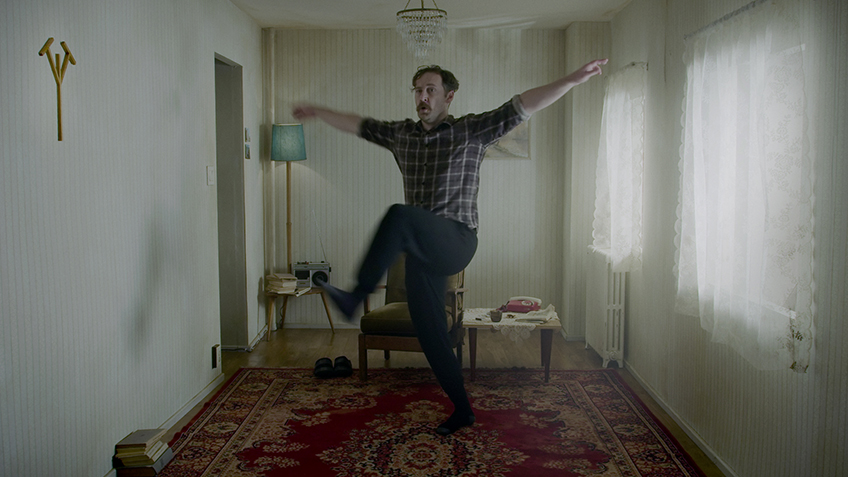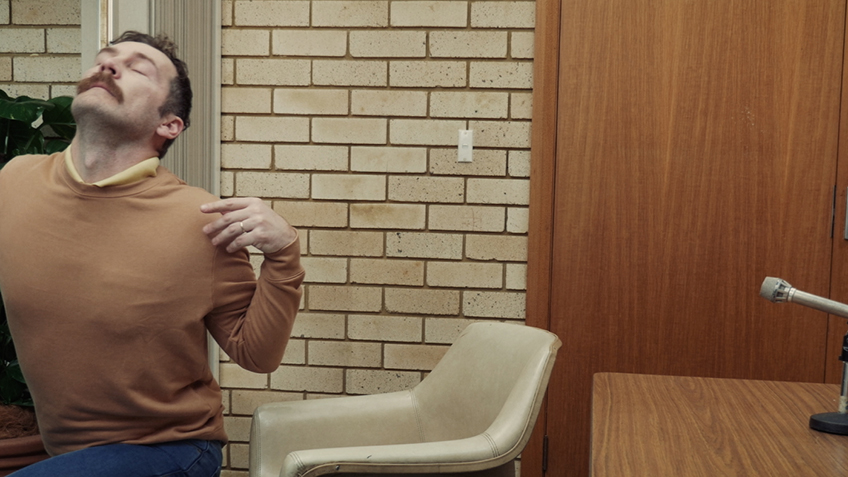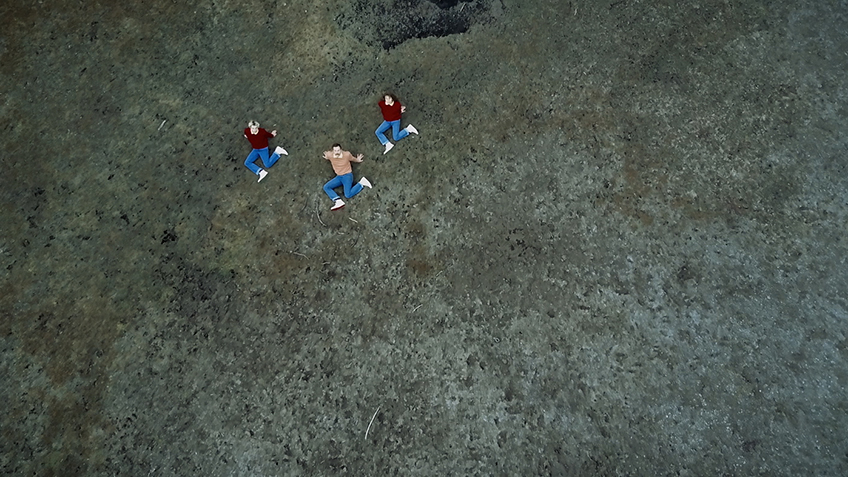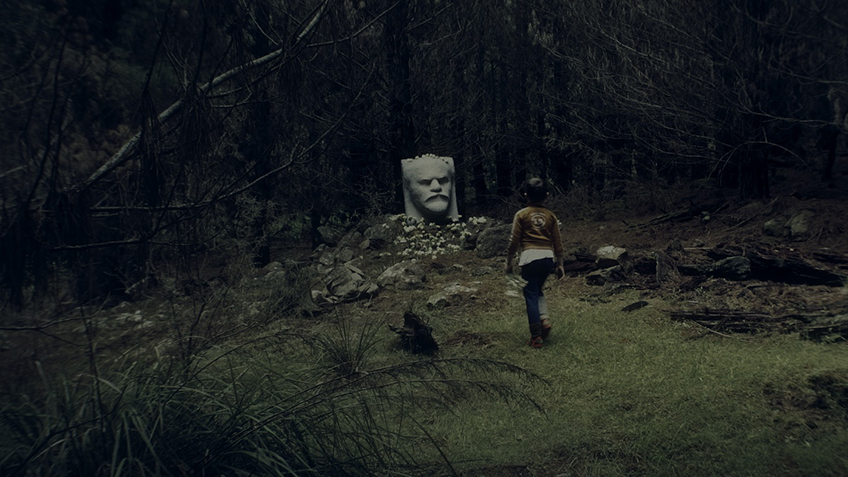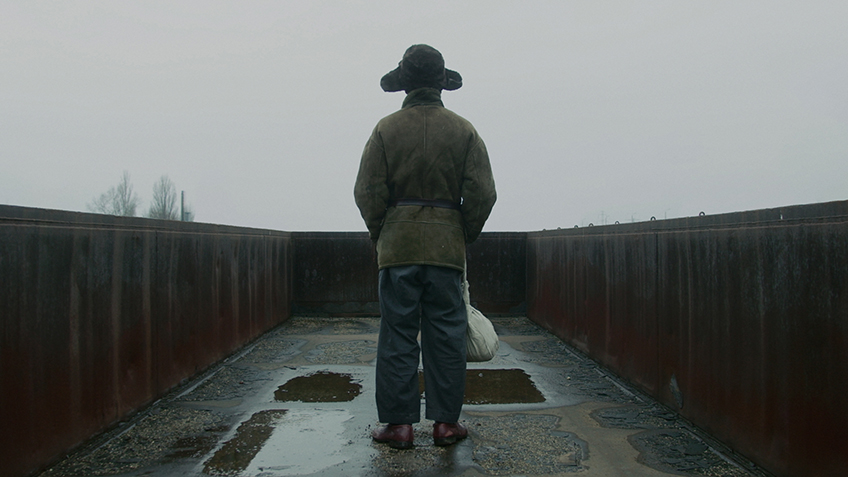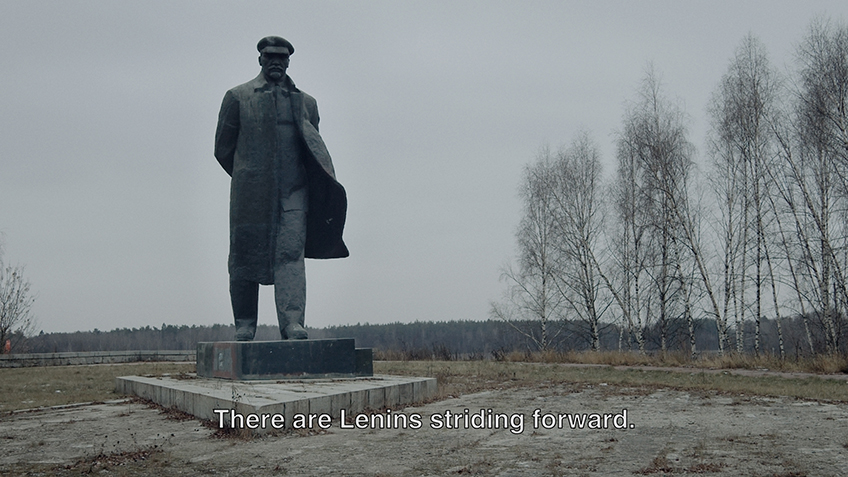Invocation Trilogy curator Daniel Mudie Cunningham reflects on language, politics and history in Kuba Dorabialski’s work.
Are you have faith? asks the dour bureaucrat of a man who might as well be his reflection.
The same actor plays both sides of this interrogation: the man who questions and the man who answers. But he can’t answer out loud, let alone in writing. It’s very embarrassing, he says. Laying claim to faith is to speak the unspeakable and acknowledge something inherently abstract or irrational, emotional or weak. Especially for a man; especially for a white man. Negotiating a gesture as his reply, a wordless sequence of reticent movement unfolds. Initially, his actions are jerky and restless, like an uncomfortably seated teenager waiting for the bell. And when it chimes without a sound, his body contorts into a chain of strange signals expressed somewhere between pantomime and breakdancing. Saying it with his body without saying it in words.
That’s enough. OK. I understand.
I understand only because English subtitles appear on screen as I watch Invocation Trilogy 1: Floor Dance of Lenin’s Resurrection. The language spoken between both men – each played by maverick Polish Australian artist Kuba Dorabialski – is nonsensical and bewildering. A hybrid of Polish, Russian, Bulgarian, Ukrainian and Serbo-Croat, Dorabialski jokingly calls his invented Slavic dialect ‘shni shni’ [Шни Шни]. To his Polish comrades it sounds like he’s speaking Czech, while Russians think he’s trying to talk in Russian, badly. Shni shni is like his adopted ‘mother tongue’. Broken Slavic subtitled in Broken English. Are you have faith?
Invocation Trilogy is Dorabialski’s most ambitious work to date, presenting like a dissertation that synthesises his obsessions with how language functions as a loaded system of signification within and for the migrant imagination. Dorabialski settled in Australia with his family in 1981 at the age of two. He learnt to speak English when he started school in Sydney, while at home he was exposed to a cacophony of languages through world cinema programming on SBS TV. These formative experiences led to the formation of an art and writing practice that reflects on language and leftist politics through the prism of European film history.
Dorabialski started Invocation Trilogy in 2017 as a way of thinking through the Eastern European socialist experiment of the 20th century and its fraught legacy and nostalgic turn. A self-professed Marxist-Leninist, Dorabialski surveys this epoch in history from the vantage point of two key dates: 1917, representing the beginning of the Russian Revolution; and 1991, when the Soviet Union came to an end. Commencing in 2017, a century after this narrative was first set in train, Dorabialski invokes Walter Benjamin’s ‘angel of history’ whose gaze was fixed on the past while a storm of progress piled history’s wreckage at his feet before being propelled backwards into the future (Theses on the Philosophy of History, 1940). The angel manifests here as two ghostly adult male figures bookending Socialism’s heyday. Seated in the middle of a pine forest behind Dorabialski as protagonist, the angels of 1917 and 1991 triangulate the narrative with Dorabialski denoting an ambiguous kinship to the present. In the second episode of the trilogy, Seven Revisionists, they transmogrify as pubescent pilgrims trekking through the same forest looking for Lenin – the spectral force binding it all together.
Completing Connection of the Sticks in 2021 – 30 years since the dissolution of the Soviet Union – Dorabialski knits together a feature-length narrative traversing 19 parts, each one like a postcard from the ruins of the 20th century. Every detour to locales in Poland, Russia and Ukraine is demarcated by a title card mapping this constellation of places divested of former claims to power and glory. As narrator, Dorabialski fashions a sweeping tale where truth and make-believe coalesce as all good mythologies should. Personal, social, cultural and political histories become a folkloric framework for mysticism and the absurd. Revisionism as magical realism.
An early scene in Connection of the Sticks tells the story of the artist’s grandfather as a teenage boy. Against the backdrop of World War II, he returns home to Poland by train upon fleeing a Siberian prison camp. Frostbitten and hungry, alone on the roof of the train, he experiences an inner moment of peace as he rejects the idea of God. In the distance a storm brews supplanting thunder and lightning in God’s place. A key trope of capitalist modernity, the train not only provides passage through a world co-opted by industrialisation, but also had become emblematic of modernist ideologies of progress. Like Benjamin’s storm of progress, it blows in from Paradise as it catapults the narrative into a retrospective future. Are you have faith?
Lightning and electricity return at key points to charge the story with a puzzling mix of optimism and foreboding. Powered as it is by the strong-arm of revolution versus mysticism and its spells. As Connection of the Sticks wends its way to Moscow, Dorabialski pays tribute to the Lenin statues dotting the city, country and continent as relics of proletariat hope and aspiration. The dead Lenins are brought to life through an affecting blend of semiotics and poesis. Of the 7,194 estimated Lenins in Europe, Moscow has 107 of them, which for Dorabialski are characterised by their frozen poses (stern, silent, quizzical) or condition (damaged, missing, dead). What a useful army all these Lenins would make, to quote the narrator’s shni shni in subtitles. If only we could breathe life into all that granite, iron and cement.
In pairing a rejection of God with a failed set of politics espoused by Lenin, Dorabialski’s film comes as various monuments to racism and slavery are deposed in the present. With all major paradigm shifts in history, the toppling of statuary becomes a symbolic touchstone of uprising and catharsis. The collapse of the Soviet Union, a case in point. Though Lenin was opposed to the idea of the monument in his image, they popped up everywhere like weeds after he died – a radical political leader in life destined for sainthood immemorial. By reflecting on the cult of personality driving politics and religion in equal form, Dorabialski turns to nostalgia, surprisingly, as a vehicle for release. If Invocation Trilogy is a fan letter to a dead Lenin, its return to sender explodes on the dancefloor. Are you have faith?
Written by Daniel Mudie Cunningham
Hear: Artist Talk
